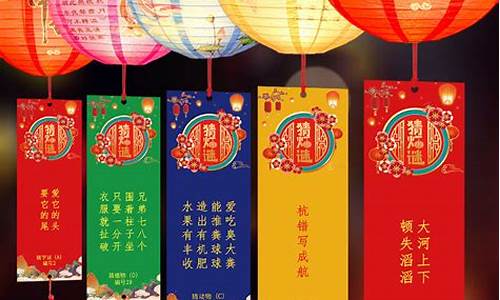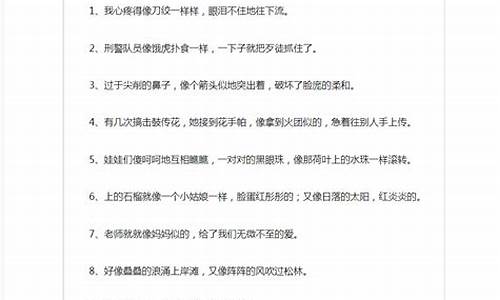您现在的位置是: 首页 > 成语出处 成语出处
猜灯谜用英语怎么说?-猜灯谜用英语怎么说
tamoadmin 2024-09-26 人已围观
简介猜字谜的英语:word puzzle。重点词汇:puzzle英 [?p?zl] ? 美 [?p?z?l] ?vt.使迷惑,使难解。vt.& vi.为难,伤脑筋。n.难题;智力测验,智力玩具;令人费解的事[人];谜一般的事物。短语Word Search Puzzle?益智单词搜索 ; 经典版Topi Word search puzzle?文字迷宫wordboxer word search puzzl

猜字谜的英语:word puzzle。
重点词汇:
puzzle
英 [?p?zl] ? 美 [?p?z?l] ?
vt.使迷惑,使难解。
vt.& vi.为难,伤脑筋。
n.难题;智力测验,智力玩具;令人费解的事[人];谜一般的事物。
短语
Word Search Puzzle?益智单词搜索 ; 经典版
Topi Word search puzzle?文字迷宫
wordboxer word search puzzle?经典版
Word Search Puzzle Game?词搜索
扩展资料
同近义词
1、enigma
英 [?'n?gm?]? 美 [?'n?gm?]?
n. 谜,不可思议的东西
短语
Enigma Variations?谜语变奏曲 ; 变奏曲 ; 谜之变奏曲 ; 极地情圣
Lab Enigma?实验室之谜 ; 未知的病毒
Enigma Express?神秘列车
2、difficult problem
难题;难问题
短语
a difficult technical problem?一个难题
difficult point problem?难点问题
difficult technical problem?技术攻关
各种中国传统节日的英文介绍
元宵节英语手抄报内容可以体现作者的英文水平和历史认识,我整理了“元宵节英语手抄报内容短语”仅供参考,希望能帮助到大家!
元宵节英语手抄报内容短语一
元宵节英语手抄报内容短语二
元宵节英语手抄报内容短语三
元宵节英语手抄报内容短语四
元宵节英语手抄报内容短语五
1、Eating Yuanxiao 吃元宵
Yuanxiao is the special food for the Lantern Festival. It is believed that
Yuanxiao is named after a palace maid, Yuanxiao, of Emperor Wu Di of the Han
Dynasty. Yuanxiao is a kind of sweet dumpling, which is made with sticky rice
flour filled with sweet stuffing. And the Festival is named after the famous
dumpling. It is very easy to cook - simply dump them in a pot of boiling water
for a few minutes - and eaten as a desert.
元宵是元宵节的特色食品。据说,元宵是因汉武帝时期的一位名叫元宵的宫女而得名。元宵是一种带馅儿的甜食,是由糯米粉加上甜的馅料制成。元宵节就是因此食品得名。元宵的烹制方法非常简单,将元宵倒入装满沸水的锅中煮几分钟就可以了。
2、Guessing lantern riddles 猜灯谜
"Guessing lantern riddles"is an essential part of the Festival. Lantern owners
write riddles on a piece of paper and post them on the lanterns. If visitors
have solutions to the riddles, they can pull the paper out and go to the lantern
owners to check their answer. If they are right, they will get a little gift.
The activity emerged during people's enjoyment of lanterns in the Song Dynasty
(960-1279). As riddle guessing is interesting and full of wisdom, it has become
popular among all social strata.
猜灯谜也是元宵节活动的一个基本组成部分。灯笼的所有者将谜语写在一张纸条上,然后将纸条展示在灯笼上。如果赏灯者猜出谜语,就将纸条取出,然后找灯笼所有者确认答案。打对的话,他们就可以领取一份小礼品。这个活动起源于宋朝(960——1279)。猜灯谜活动极富情趣和智慧,因此在全社会广受欢迎。
3、Watch fireworks 看烟火
In the daytime of the Festival, performances such as a dragon lantern dance, a
lion dance, a land boat dance, a yangge dance, walking on stilts and beating
drums while dancing will be staged. On the night, except for magnificent
lanterns, fireworks form a beautiful scene. Most families spare some fireworks
from the Spring Festival and let them off in the Lantern Festival. Some local
s will even organize a fireworks party. On the night when the first
full moon enters the New Year, people become really intoxicated by the imposing
fireworks and bright moon in the sky.
元宵节的白天会有舞龙舞狮、划旱船、扭秧歌、踩高跷。而在晚上,除了各种大型灯会,灿烂的焰火也是一幅美丽的画卷。很多家庭在春节时会留下一部分烟花等着元宵节放。有的地方政府甚至会组织焰火晚会。当新年的第一轮圆月升上夜空时,人们都会因燃放的烟火和空中的明月而兴奋。
灯谜英语怎么说?
1、春节(农历一月一日) Spring Festival;Chinese New Year's Day
由来:
Primitive beliefs and sacrificial culture are important factors in the formation of New Year's Day.?
原始信仰和祭祀文化是春节形成的重要因素。
习俗:
such as Lunar New Year's dinner, keeping the age, New Year's money, temple fairs, flower lanterns and other customs.
如团年饭、守岁、压岁钱、庙会、赏花灯等习俗。
2、元宵节(农历一月十五日) Lantern Festival(龙灯节直译)
由来:
The custom of burning lamps on the fifteenth day of the first lunar month is related to the spread of Buddhism to the east.
正月十五燃灯的习俗与佛教东传有关。
习俗:
Lantern Festival mainly includes a series of traditional folk activities,
such as watching lanterns, eating dumplings, guessing lantern riddles and setting off fireworks.
元宵节主要有赏花灯、吃汤圆、猜灯谜、放烟花等一系列传统民俗活动。
3、清明节(公历4月5日前后,农历二月后半月至三月上半月间) Tomb-Sweeping Day
由来:
The Qingming Festival originated from the Spring Festival and the Spring and Autumn Festival in ancient times.
清明节源于上古时代的春祭,春秋二祭,古已有之。
习俗:
Tomb-sweeping, ancestor-sacrificing and outing are common basic etiquette and custom themes.
扫墓祭祖、踏青郊游是共同基本礼俗主题。
4、端午节(农历五月初五) Dragon Boat Festival(龙舟节直译)
由来:
Dragon Boat Festival, with a long history, evolved from the dragon totem worship held in Baiyue in ancient times.
端午节,历史悠久,由上古时代百越举行龙图腾祭祀演变而来。
习俗:
The Dragon Boat picking and rice dumplings are the two main themes of the Dragon Boat Festival.
扒龙舟与食粽子是端午节的两大礼俗主题。
5、中秋节(农历八月十五) Mid-Autumn (Moon)Festival
由来:
The Mid-Autumn Festival originated from the worship of celestial phenomena,
and evolved from the worship of the moon on the autumn evening in ancient times.
中秋节源自天象崇拜,由上古时代秋夕祭月演变而来。
习俗:
offering sacrifices to the moon, enjoying the moon, eating moon cakes,?
playing with lanterns, appreciating osmanthus flowers and drinking osmanthus wine.
中秋节自古便有祭月、赏月、吃月饼、玩花灯、赏桂花、饮桂花酒等民俗
6、重阳节(农历九月九日) Double-ninth Day(重九节直译)
由来:
The origin of Chongyang Festival can be traced back to ancient times. In ancient times,?
there were activities of harvest sacrifice and Mars sacrifice in autumn and autumn.
重阳节的源头,可追溯到上古时代。古时季秋有丰收祭天、祭祀大火星活动。
习俗:
There are customs such as climbing high to pray for blessings, visiting chrysanthemums in autumn, wearing dogwood,?
offering sacrifices to gods and ancestors, and feasting for longevity.
有登高祈福、秋游赏菊、佩插茱萸、祭神祭祖及饮宴求寿等习俗。
百度百科——中国传统节日
灯谜是中国传统文化的一部分,灯谜并不是都题写在灯上,绝大多数情况下是在灯笼环绕的环境里用纸条、彩带、小旗子作为作为载体悬挂供人们阅读猜测结果,如果觉得自己猜中了就可以撕下拿去兑奖,如果答错,由管理人员再次悬挂。里面不仅包括字谜、可以说包罗万象,是对人抽象和逻辑思维的一次综合考验。如果用riddles来表示是欠妥的。我建议执意要用英文,可以用拼音,否则用lanterns riddles,象征代表一下就行了。因为国外没有,就像春卷一样,拼音我觉得足够了。
上一篇:暂无









